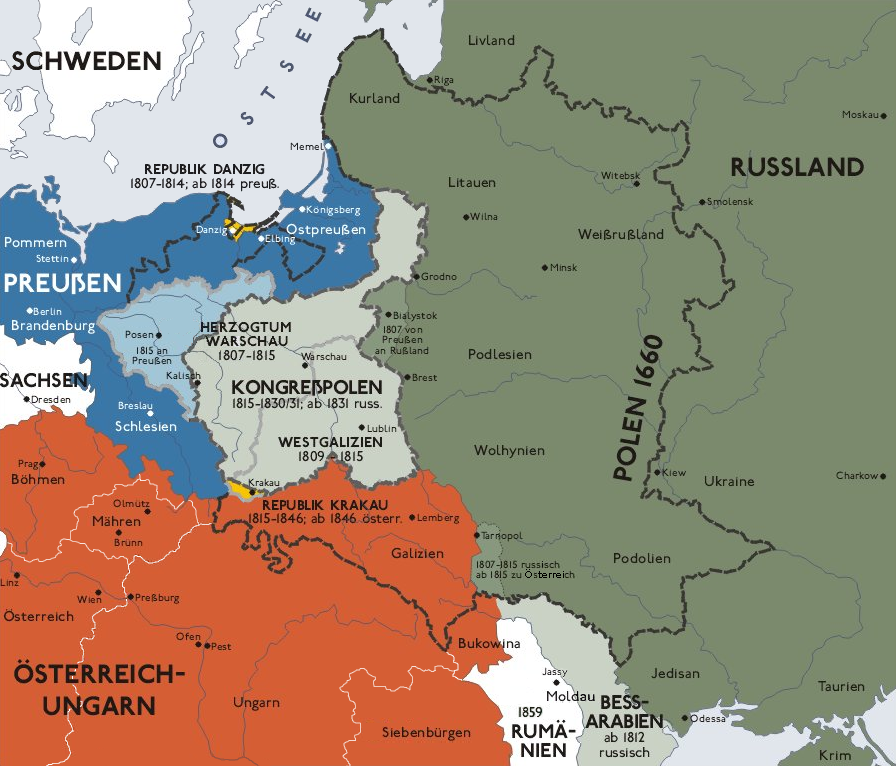Alvensleben Convention on:
[Wikipedia]
[Google]
[Amazon]
 The Alvensleben Convention was a treaty between the
The Alvensleben Convention was a treaty between the
 The Alvensleben Convention was a treaty between the
The Alvensleben Convention was a treaty between the Russian Empire
The Russian Empire was an empire that spanned most of northern Eurasia from its establishment in November 1721 until the proclamation of the Russian Republic in September 1917. At its height in the late 19th century, it covered about , roughl ...
and the Kingdom of Prussia
The Kingdom of Prussia (, ) was a German state that existed from 1701 to 1918.Marriott, J. A. R., and Charles Grant Robertson. ''The Evolution of Prussia, the Making of an Empire''. Rev. ed. Oxford: Clarendon Press, 1946. It played a signif ...
, named after general Gustav von Alvensleben. It was signed in St. Petersburg on 8 February 1863 by General Alvensleben and Alexander Gorchakov, the Russian Foreign Minister.
The Convention
In January 1863 an uprising against the Russian rule inCongress Poland
Congress Poland or Congress Kingdom of Poland, formally known as the Kingdom of Poland, was a polity created in 1815 by the Congress of Vienna as a semi-autonomous Polish state, a successor to Napoleon's Duchy of Warsaw. It was established w ...
occurred. Prussia immediately closed its border and mobilised the Prussian Army to secure its eastern provinces against a similar event. Initiated by Prime Minister Otto von Bismarck
Otto, Prince of Bismarck, Count of Bismarck-Schönhausen, Duke of Lauenburg (; born ''Otto Eduard Leopold von Bismarck''; 1 April 1815 – 30 July 1898) was a German statesman and diplomat who oversaw the unification of Germany and served as ...
, Alvensleben, the Prussian King's personal adjutant, was dispatched to Tsar Alexander II of Russia
Alexander II ( rus, Алекса́ндр II Никола́евич, Aleksándr II Nikoláyevich, p=ɐlʲɪˈksandr ftɐˈroj nʲɪkɐˈlajɪvʲɪtɕ; 29 April 181813 March 1881) was Emperor of Russia, Congress Poland, King of Poland and Grand Du ...
’s court to negotiate common measures with regard to the insurgents.
The two powers agreed on the right of each of their military forces to cross the border in pursuit of Polish revolutionaries and to extradite them to Russian military courts.
The convention was never implemented as Russia dealt on its own with Polish uprising.
Political consequences
In Prussia
Bismarck, who had just been appointed Prime Minister in September 1862 and ruled without a parliamentary majority, was criticized by liberal Prussian politicians likeHans Victor von Unruh
Hans Victor von Unruh (March 28, 1806 – February 4, 1886) was a Prussian civil servant and politician, President of the Prussian National Assembly of 1848 and Member of the ''Reichstag'' of the German Empire.
Biography
Unruh was born i ...
and Heinrich von Sybel, who sympathized with the Poles plight.
The treaty led to clashes in the Prussian Landtag and after the president of the parliament interrupted Bismarck during a dispute over his Polish policy, he stated that he answered only to the King and was “not subject to the disciplinary authority vested in the president of the parliament.”
The struggle between Bismarck and the Diet continued, and on 22 May 1863 the Diet sent a sharp note to the King: "The House of Deputies has no further means of coming to terms with this ministry.... Every further negotiation only strengthens our conviction that a chasm separates the advisors to the Crown and the Country."
As a result, the king finally dissolved the diet.
Meanwhile, Bismarck publicly stated it was on the initiative of the Russians that the treaty had been formed, while Russian Foreign Minister Gorchakov declared that the Convention has never been put into force.
International affairs
The convention was criticized by western liberals and led to a serious diplomatic crisis.Great Britain
Great Britain is an island in the North Atlantic Ocean off the north-west coast of continental Europe, consisting of the countries England, Scotland, and Wales. With an area of , it is the largest of the British Isles, the List of European ...
and the Austrian Empire
The Austrian Empire, officially known as the Empire of Austria, was a Multinational state, multinational European Great Powers, great power from 1804 to 1867, created by proclamation out of the Habsburg monarchy, realms of the Habsburgs. Duri ...
protested and especially Napoleon III
Napoleon III (Charles-Louis Napoléon Bonaparte; 20 April 18089 January 1873) was President of France from 1848 to 1852 and then Emperor of the French from 1852 until his deposition in 1870. He was the first president, second emperor, and last ...
, Emperor of the Second French Empire
The Second French Empire, officially the French Empire, was the government of France from 1852 to 1870. It was established on 2 December 1852 by Louis-Napoléon Bonaparte, president of France under the French Second Republic, who proclaimed hi ...
, showed his sympathies towards the uprising and suggested the dismissal of Bismarck as Prussian Prime Minister. Empress Eugenie already showed a map of Europe to the Austrian ambassador, which contained an independent Poland and a major realignment of European frontiers.
The convention improved Russo-Prussian relations, while Franco-Russian relations were strained by the open sympathy Napoleon III had shown towards the Poles. Bismarck himself later saw it as a precondition for the Russian neutrality in the Austro-Prussian and Franco-Prussian War
The Franco-Prussian War or Franco-German War, often referred to in France as the War of 1870, was a conflict between the Second French Empire and the North German Confederation led by the Kingdom of Prussia. Lasting from 19 July 1870 to 28 Janua ...
.
References
{{DEFAULTSORT:Alvensleben Convention 1863 in Poland January Uprising Prussia–Russia relations 1863 treaties Treaties of the Russian Empire Treaties of the Kingdom of Prussia 1863 in the Russian Empire 1863 in Prussia 1863 in the German Confederation Bilateral treaties of Russia